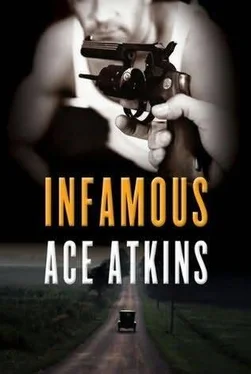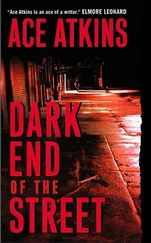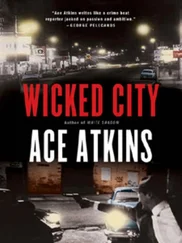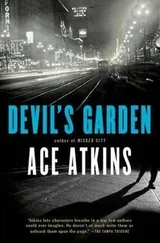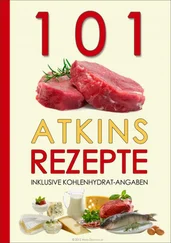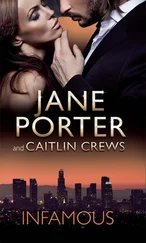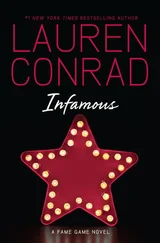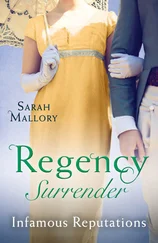“The Kid said that?” Harvey asked, lighting up a Chesterfield and fanning out the match. “I don’t even know what that means. ‘Like a mule’?”
“He’d been drinking.”
“What’d you say?”
“I don’t know,” Miller said, shrugging again. “I didn’t say much. Just stuck a.45 inside his mouth and asked if he’d like to see how little brains he’s got.”
“He may hold a grudge.”
“You think?”
“I do, Verne,” Harvey said. “Things like that can stay with a person.”
The hot wind off the barren earth felt good on the men’s faces, and you could smell the hard earth and dust and dry land. The farm had a familiar old L-frame and a big red barn with a roof painted with the words MERAMEC CAVERNS U.S. 66 STANTON MISSOURI. The shadows were long and smooth across the rough-hewn boards, and the sunlight painted the side of the barn in a soft yellow glow.
“Vi’s got you wrapped tight, Verne,” Harvey said. “And don’t take no offense in this, but if you don’t watch your pecker, she’s gonna lead you right into a trap.”
“What’s a man to do?”
“Love.”
“Yeah,” Miller said with that cruel, twisted mouth. “It’s worse than the Spanish flu.”
“Now, take George,” Harvey said. “That’s another matter. He can’t even see the trap he’s in.”
“The pussy trap.”
“Snap.”
“You’re going to thieve their money, aren’t you?” Miller asked.
Harvey smiled and pinched the Chesterfield between his thumb and forefinger. He shrugged a bit and smiled again.
“You’re gonna get the Kid to switch out the cash on the bank job with Kelly’s dough, and we’re going to take it all.”
“You got a problem with that?”
“I don’t have any love for those people.”
The Buick sat in the slanting shadow of two big silos crawling with vines. A couple Ford tractors lay rusted and turned upside down in a gully. As the men stepped on the porch, they found a busted door held upright by an old padlock. A note from the bank ruffled in the wind.
“This country is turning to shit,” Harvey said, snatching the notice from the tacks and tossing it on the ground.
“Everything is turning to shit.”
“They took my gas stations,” he said. “They took goddamn everything.”
“Who?”
“Fat men.”
“Who?”
“Men who feed at the trough of our goddamn sweat.”
“You’re talking like a communist,” Miller said.
“Maybe I am.”
“Communism is for suckers, too.”
“What do you believe in, Verne?”
“Myself,” he said, his face not changing expression.
Harvey Bailey excused himself and walked along the beaten porch of the house, the wind making rattling noises through the broken windows. A door kept drumming with the shotgun wind, and every one of Harvey’s steps through the haunted guts of the home was counted until he reached the back stairs and walked out onto that wide expanse of cleared land, an old familiar path now grown up with weeds and destroyed and hidden. But he could walk that path in his sleep, feeling that draw and pull to a shadowed little grove of walnut trees blooming with nuts wrapped in green.
You wouldn’t know it to see it. The headstone simply read J. HARVEY BAILEY / SEPTEMBER, 5 1920-JULY, 12 1923. Bailey felt a shooting pain as he got to his knees and pulled away the weeds and vines and straightened the small stone lamb, storm-beaten, and now resembling more rock than animal. He stayed there, smoothing away the moss with his hand-painted tie, until he heard Miller calling for him, and, using the solid trunk of the tree for balance, he got back on his feet.
“You think Harry Sawyer’s back up there?” Verne Miller asked as he walked close, toting a shovel.
“Where else would he go?” Harvey asked, rolling the sleeves of his white shirt to the elbow and lighting another cigarette. “We’ll head to the Green Lantern first thing. I sure wouldn’t mind one of his pork chop sandwiches.”
“And maybe Nina’s?”
“How can a man go to Saint Paul and not stop by and say hello to the girls?”
“Right here?”
“Right here,” Harvey said. “Hand it to me.”
Harvey Bailey felt the hot wind push a cloud over the sun, sliding a cool shadow over his face. He slid the tip of the shovel to the known spot and began to dig.
“How much is buried?” Miller asked.
“Just enough.”
JONES THUMBED SOME TOBACCO INTO HIS PIPE AND EYED Mr. Charles Urschel. Urschel’s face was gaunt and hollow, the flesh around his eyes reddened and blistered. He had changed into fresh clothes that morning-lightweight navy trousers and a white short-sleeved linen shirt. Jones could tell he’d showered and shaved, had his breakfast and coffee. But despite the morning routine, Urschel hadn’t stopped tapping his foot and checking his timepiece since he’d sat down.
Jones struck a match and got the bowl going, the cavernous study empty besides Jones and SAC Colvin. The young boy displaying his talents as notetaker, keeping quiet and letting Jones take the lead, the interview continuing from where they stopped late last night, when Berenice Urschel begged Jones to let her husband get some rest. Jones had complied, but then had shown up at six that morning, and had waited damn-near two hours until Urschel said he was ready.
“I hope this won’t take long.”
“Could take a while, sir.”
“I haven’t set foot at my company.”
“You’ll have some time this afternoon.”
“But I didn’t see anything,” Urschel said. “Everything I could know I told you last night. I even told you about the well and how bad that water tasted. You seemed to take great interest in the mineral quality of it last night. Perhaps that will lead to something.”
“Yes, sir,” Jones said, walking and smoking and moving about in the room, lined from bottom to top with leather-bound volumes of old stories and old tales of murder and adventure, and very serious men taking things very seriously. “Tell me about the boy.”
“He was a boy.”
“You said he went by ‘Potatoes.’ ”
“I doubt that was his real name. Probably something those crooks made up.”
“You never know,” Jones said. “I knew a boy in El Paso that everyone called ‘Turd Head.’ ”
“Well, I doubt the moniker.”
“But he watched you most?”
“He did.”
“And read to you?”
“He did. Yes.”
“What sorts of material?”
“Magazines.”
“What sort?”
Urschel was quiet for a moment and then said, “ Ladies’ Home Journal . McCall’s . Frivolous things in which I had no interest.”
“Wasn’t your kind of reading?”
“It passed the time,” Urschel said. “The boy also had some kind of brochure on the World’s Fair and read from that quite often. In fact, I would say he was obsessed with it. Liked to read a portion about native dancers who dance in the nude.”
“Did he offer anything personal from the Fair?”
“Just that he planned on going.”
“Isn’t everybody?”
The more he smoked, the more Jones paced. A flurry of questions came to mind as he paced, smoke breaking and scattering with his steps.
“What about the old man?” Jones said. “You conversed with him?”
“Yes, sir.”
“About?”
“Nothing of consequence. We had some bad weather the night before they released me. There was wind and rain, and I asked them if they had tornadoes.”
“What did they say?”
“Said they had a lot more tornadoes down in Oklahoma and Texas.”
“That was a plant,” Jones said with certainty. He strolled behind Urschel’s desk and pulled back a thin layer of drapes, seeing the newsmen gather around E. E. Kirkpatrick, who read a statement from the family that he’d typed out over breakfast. The statement basically read that Mr. Urschel didn’t recall a goddamn thing about his kidnappers, which was a view that old Charlie kept on sharing with Jones.
Читать дальше
